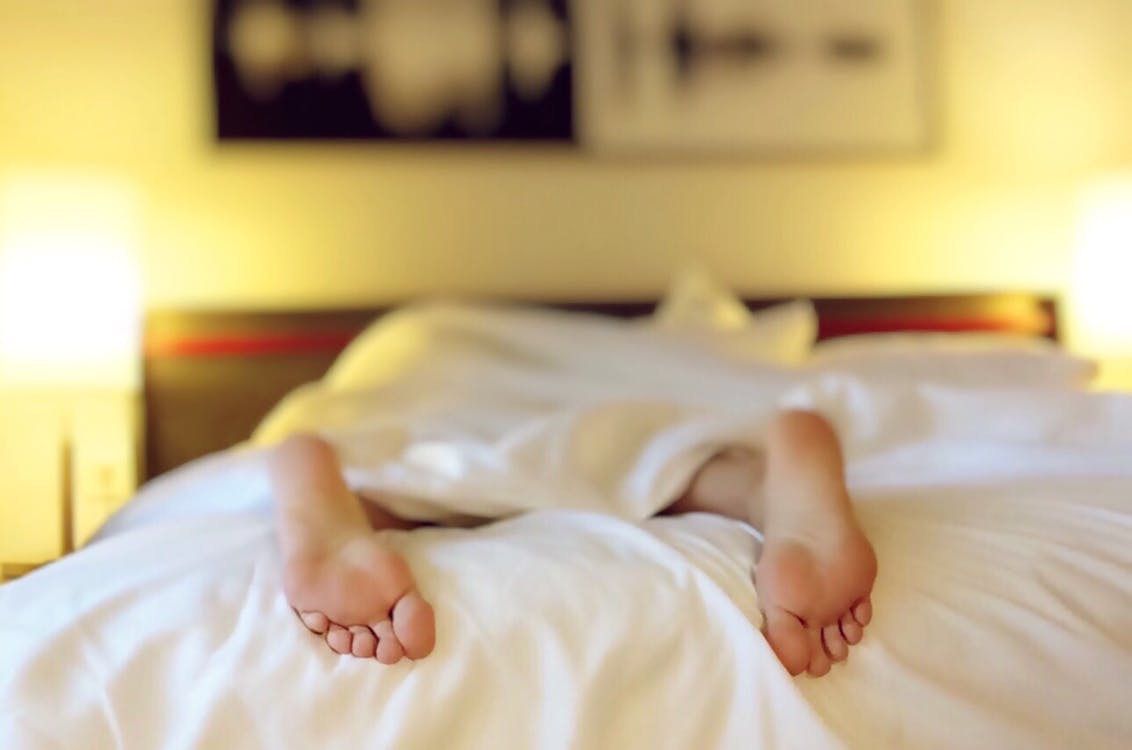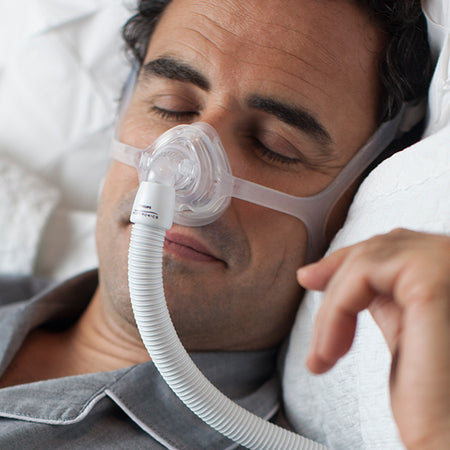As you and your spouse age, certain health problems become more likely. While most people worry about conditions like heart disease, you should also be aware of the risks posed by sleep apnea. Studies have consistently found that the likelihood of developing obstructive sleep apnea increases with age, and that men are more likely to develop this condition than women.
Sleep apnea is a condition in which the breathing passages close off during sleep. The body’s oxygen supply is cut off, which eventually causes the individual to wake up gasping for breath. These incidents can occur dozens of times in a single hour, significantly disrupting sleep.
Quite often, the individual who is suffering from sleep apnea is unaware of their condition. They may feel more fatigued during the day, but they won’t remember waking up during the night. Instead, it is their spouse who typically notices excessively loud snoring, gasping for breath, or choking sounds.
In such situations, it is extremely important that you have your spouse take a sleep study to determine if they have sleep apnea, and to see just how severe their condition is. In many cases, sleep specialists will recommend that they start using a CPAP machine.
Using a CPAP machine can significantly change your spouse’s routine — and even your own. Here is what you should know about sleep apnea and encouraging your spouse to use this form of treatment.
Untreated Sleep Apnea Has Serious Consequences
 First, it is essential that you understand that regardless of whatever preconceived notions you or your spouse might have regarding CPAP therapy, few things are worse than letting sleep apnea run unchecked.
First, it is essential that you understand that regardless of whatever preconceived notions you or your spouse might have regarding CPAP therapy, few things are worse than letting sleep apnea run unchecked.
Frequent interruptions to sleep have significant long-term consequences. Untreated sleep apnea has been linked to high blood pressure, heart disease, stroke, COPD, type 2 diabetes, and pneumonia. Sleep apnea can even increase the risk for nighttime asthma attacks. During a time when the COVID-19 pandemic has been found to be the greatest threat to individuals with many of these underlying conditions, the dangers of sleep apnea become even more apparent.
How does this happen? With heart health issues, part of the problem is that a lack of oxygen will put added pressure on the cardiovascular system. This raises blood pressure as the body tries to maintain the flow of oxygen to the heart and brain. As oxygen is cut off from the lungs, individuals are also more likely to inhale fluids.
Many of these conditions are interrelated with sleep apnea. As these health problems worsen, the severity of sleep apnea increases. Similarly, as sleep apnea gets worse, these related health conditions grow more severe.
It goes without saying that you wouldn’t want your spouse to suffer through these life-threatening medical conditions. The medical bills alone would likely far outpace any amount of money that you spent on CPAP equipment. Conditions like COPD and heart disease could shave years off your spouse’s life.
Sleep Apnea and Relationship Quality
 While physical health problems get much of the attention, untreated sleep apnea could also negatively impact your spouse’s mental and emotional wellbeing. Sleep apnea has been repeatedly connected with depression and anxiety. Some studies have even linked sleep apnea with suicidal thinking.
While physical health problems get much of the attention, untreated sleep apnea could also negatively impact your spouse’s mental and emotional wellbeing. Sleep apnea has been repeatedly connected with depression and anxiety. Some studies have even linked sleep apnea with suicidal thinking.
While such mental health issues can affect many aspects of your loved one’s life, there is no denying that as their spouse, you are the most likely to feel the brunt of these health problems.
Just consider how you feel after a night when you didn’t get enough sleep. Most of us will feel tired and moody. We become more irritable and more likely to get angry over relatively insignificant things. We don’t want to spend time with friends and family — instead, we just want to catch up on sleep.
With untreated sleep apnea, these issues become much more severe because the interrupted, unfulfilling sleep is occurring every night. Perhaps even more significantly, your spouse’s sleep apnea will most likely interrupt your sleep as well.
Just consider this overview from the Journal of Clinical Sleep Medicine: “As compared to spouses from the general population, spouses of patients with heavy snoring and OSA are three times more likely to report insomnia symptoms, including difficulty initiating and maintaining sleep and unrefreshing sleep, and twice as likely to report fatigue and daytime sleepiness even after controlling for age, body mass index (BMI), number of children younger than 18 y, work time, own snoring, and use of sleep medications. Symptoms associated with OSA are major causes of sleep disturbance among partners. Among 37 partners of patients suspected of having OSA, 55 percent reported that patients' snoring disturbed their sleep every night or almost every night.”
In other words, untreated sleep apnea won’t just make your spouse more irritable and tired — it will do the same to you. This constant fatigue can also negatively impact sex drive. That’s hardly a recipe for a healthy, happy relationship.
Do You Want Snoring, or CPAP White Noise?
 Despite the serious consequences of untreated sleep apnea, many are reluctant to begin treatment. This is often attributed to worries over how their using a CPAP machine will adversely affect their spouse. One of the most-cited worries about using a CPAP machine is that it will be too noisy, keeping both the user and their spouse awake. This is simply not true, especially if your spouse’s obstructive sleep apnea is causing loud snoring each night.
Despite the serious consequences of untreated sleep apnea, many are reluctant to begin treatment. This is often attributed to worries over how their using a CPAP machine will adversely affect their spouse. One of the most-cited worries about using a CPAP machine is that it will be too noisy, keeping both the user and their spouse awake. This is simply not true, especially if your spouse’s obstructive sleep apnea is causing loud snoring each night.
To put things in perspective, most modern CPAP machines operate at roughly 25 dbA. This is a level that the American Academy of Audiology defines as faint or soft — louder than rustling leaves, but softer than a whisper.
That is nothing compared to snoring. Insomnia.net reports that most snoring falls between 60 to 90 db — a range similar to vacuum cleaners, alarm clocks, or even hair dryers or blenders. Even using earplugs typically isn’t enough to fully eliminate the sound of such loud snoring.
Another issue in comparing CPAP and snoring noise levels is their consistency. Yes, a CPAP machine will produce a whirring noise while in operation, but that noise level is consistent throughout the night. In many ways, this makes it similar to a white noise machine. Snoring, on the other hand, can be sporadic. Your spouse might snore nonstop for five minutes, stop for one minute, and then start snoring again. This can make it much harder to fall asleep.
In fact, while the other side effects of sleep apnea can also hurt relationships, snoring is often the biggest initial problem because of how much it affects the snorer’s spouse.
As Micahel J Breus, Ph.D. explains for Psychology Today, “Poor quality and insufficient sleep interfere with our thinking skills and judgment. Lack of sleep can make us irritable and short-tempered. Poor sleep diminishes our ability to manage conflict well, increasing negative feelings and reducing our ability to empathize. Lack of sleep has been shown in scientific research to make couples feel less appreciative of each other, and to experience greater feelings of selfishness. Sound like a recipe for relationship difficulties? It is.”
In reality, if your spouse starts using a CPAP machine, it should help both of you sleep more soundly through the night. For many spouses, this could make all the difference in keeping them from needing to sleep in a different room to get a good night’s sleep.
Getting Over the ‘Look’ of CPAP Masks
 Perhaps even more concerning for some is the worry of how they will look while wearing a CPAP mask. Wearing a CPAP mask will certainly change how your spouse looks while sleeping, but you must focus on the big picture of why they are using this equipment in the first place. Articles in which spouses describe their partner as looking like Darth Vader or a fighter pilot are hardly encouraging. As an article from Washingtonian magazine notes, “For a lot of couples, this kind of change in domestic arrangements can bring up significant emotional issues. The device can profile as a totem of creeping middle-aged unsexiness — even before you glimpse yourself in the mirror.”
Perhaps even more concerning for some is the worry of how they will look while wearing a CPAP mask. Wearing a CPAP mask will certainly change how your spouse looks while sleeping, but you must focus on the big picture of why they are using this equipment in the first place. Articles in which spouses describe their partner as looking like Darth Vader or a fighter pilot are hardly encouraging. As an article from Washingtonian magazine notes, “For a lot of couples, this kind of change in domestic arrangements can bring up significant emotional issues. The device can profile as a totem of creeping middle-aged unsexiness — even before you glimpse yourself in the mirror.”
These worries can be very real for your spouse as they begin using a CPAP machine. Your response to the mask and machine (and how it makes your spouse look) could play a big role in whether they remain compliant with their therapy or not.
Because of this, it is important to keep things in perspective. Your spouse only needs to wear their CPAP mask while they are asleep. While putting on the mask shortly before bed can be helpful for some, it isn’t a requirement.
In addition, depending on your spouse’s sleeping habits and the severity of their sleep apnea, they may not necessarily need a bulky full face mask. Nasal masks and nasal pillows are far less bulky and intrusive. If your spouse’s doctor determines that these will work well for their CPAP therapy, this could help alleviate some of the concerns over how a mask makes them look.
Remember, your spouse isn’t going to be wearing their CPAP mask during the day, when you are actually interacting with them. Properly cleaning the equipment will take a bit of time and you will need to make space on a nightstand for easy access to the CPAP machine, but otherwise, the equipment should not have much of an affect on your spouse’s appearance during the times when you are both awake.
In addition, the benefits of CPAP therapy far outweigh the drawbacks. You will no longer have to stuff your head under the pillows in an attempt to drown out their snoring. You will both be better rested and happier in the morning. As a result, you’ll both reduce your risk for more serious long-term health conditions.
All of that is worth the trade-off of a mask that possibly looks a little strange when your spouse puts it on at night — a time when you probably aren’t going to be paying much attention to them, because you’re going to be asleep, too!
Be encouraging and supportive of your spouse. Be mindful of potential insecurities that may arise from wearing a CPAP mask. By offering meaningful love and support, they will be more likely to stick with their treatment, which will benefit both of you in the long run.
Adjusting to Your New Routine
Yes, having your spouse start using a CPAP machine will take some getting used to. You will need to clean and sanitize the equipment on a daily basis. Components like masks and tubing will need to be replaced every few months to ensure maximum effectiveness. You and your spouse may also need to adjust to how a CPAP machine looks.
However, these concerns shouldn’t be your focus. Remember, controlling your spouse’s sleep apnea will allow them to have the energy they need for their regular activities. Eliminating constant fatigue will improve their mood and your relationship.
By controlling sleep apnea, you can help your spouse avoid serious long-term health consequences that could lead to premature death. Ultimately, using a CPAP machine could make the difference in allowing you to have more meaningful time together in the future.
Of course, CPAP equipment isn’t exactly cheap, especially if you don’t have insurance coverage. This is where Help Medical Supplies steps in. CPAP bundles, discounted equipment, available financing, and free shipping on orders over $89 will make it easier to afford the tools your spouse needs to get a good night’s sleep.
Don’t delay getting your spouse to start needed CPAP therapy. Their health — and your relationship — just might depend on it.

